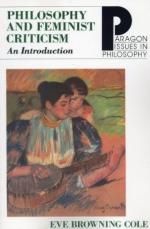|
This section contains 11,293 words (approx. 38 pages at 300 words per page) |

|
SOURCE: Watkins, Susan. “Poststructuralist Feminism.” In Twentieth-Century Women Novelists: Feminist Theory into Practice, pp. 96-121. Houndmills, England: Palgrave, 2001.
In the following essay, Watkins explores the critical writings of Hélène Cixous, Luce Irigaray, and Julia Kristeva—as well as Virginia Woolf's 1928 novel Orlando—and argues that these works function as poststructuralist critiques of assumptions about the relation of gender to culture.
Introduction
This chapter might easily have been called ‘French feminism’, because many early commentators have used this umbrella term when analysing the work of Hélène Cixous, Luce Irigaray and Julia Kristeva.1 However, there are a number of difficulties with this categorisation which make ‘poststructuralist feminism’ a more appropriate one. First, none of the three is French by birth: Cixous was born in Algeria, Irigaray in Belgium and Kristeva in Bulgaria. They exhibit more hybrid and tangential relationships with the country where they now live...
|
This section contains 11,293 words (approx. 38 pages at 300 words per page) |

|


